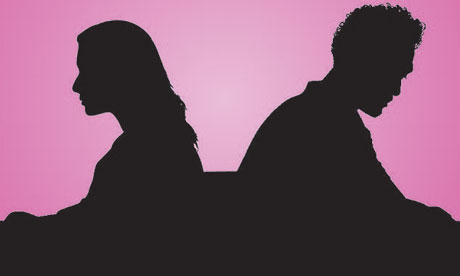
I have, finally, weeks after the rest of the world, read Rachel Cusk's Aftermath, the ultra-candid memoir of the early days of her separation from her husband of 10 years. Having compulsively read the extracts, and followed the surrounding weeks of broadsheet polemic about what, exactly, it is acceptable to say about your divorce, I felt oddly apprehensive.
On the one hand, I admit to a queasy, faintly shameful desire to be appalled, to peer under the rock Cusk has lifted up and to be pleasurably disgusted at what she is willing to offer up for public consumption. At the same time, there's the sense that we are writing on the same subject, albeit very differently, and I felt the opprobrium heaped on Cusk rubbed off on me a little: if what she did is wrong – a betrayal – is the same true of me?
Even so, I hoped it would be illuminating, as well as, or rather than, pruriently satisfying. I remember finding A Life's Work, Cusk's memoir of early motherhood, quite comforting in its refusal to sugarcoat the experience of caring for a tiny infant. Yes, it was a bleak and unrelenting, and a somewhat single-note, account of a time I recall as being one of shocking contrasts, of split-second shifts between joy and fear and despair, but, even so, it felt salutary and powerful. Not everyone feels like Cusk about becoming a mother, but those who do, to any degree, might well find some solace in the answering echo in A Life's Work.
So I read Aftermath, fast and nervously. It is raw, certainly, but I'm not sure it is the grotesque airing of dirty linen I had been given to expect. Virtually everything shocking, or transgressive, had already been cherry-picked in the published extracts and the rest is an intermittently uncomfortable, but also reflective, read.
Of course it is bleak, bleaker than A Life's Work. Cusk said it herself in this paper: "Motherhood has traumatic elements, but divorce is only darkness, only trauma." Any account of the end of a marriage is unlikely to be a riot of knee-slapping comedy and Aftermath certainly doesn't shrink from showing divorce for the grey, lingering, frightening thing it can be. I have often wished over the past year – and in this column – that I could be a bit more breezy, a bit more Noël Coward about things, but Cusk's version is quite close to my truth. What she describes – guilt, pain, confusion – is accurate, and probably universal.
She is particularly good on the limping uncertainty of the single-parent family unit in the early months of separation; the dislocation and loneliness, the self-imposed insularity when four become three. The edgy, claustrophobic atmosphere of the early chapters of the book inspired a sickly wave of recognition and recollection, then a sharp gratitude that that phase is finally over.
It's certainly a harsher, more baldly revealing kind of writing than I could ever do: I flinch, in writing and in life, from conflict and unpleasantness, even when it might be necessary or desirable; I'm hamstrung by my need to make things nice, to smooth over. There's none of that in Aftermath.
I don't know if it's brave, or reckless, or oblivious, but I confess I admire it. Reading some of the ugly, illuminating things Cusk includes, I thought of incidents I have chosen not to mention here: a conversation with X that ended with me throwing my phone at the wall in rage; the ongoing discomfort and occasional flare-ups about money, and the house. Even with the security blanket of anonymity, I simply don't have her nerve.
What has stayed with me most clearly, though, is this phrase: "I have jumped from a high place, thinking that I could fly, and after a few whirling instants have realised I am simply falling." Much of the last year has felt like that. I thought I knew how this story, our separation, ended: I needed to be on my own; we would be better apart. Perhaps that's true, but my early conviction that everything would be all right, that it was "for the best" has been shaken, again and again, to the point where right now I just don't know if it will be all right, actually.
Should she have written it? Should I be writing this column? I often wonder, and I don't know. What I do know, though, is that if I weren't writing, I would be reading, in the hope of that answering echo, and the fainter hope of a shred of reassurance that things do, generally, turn out OK.

